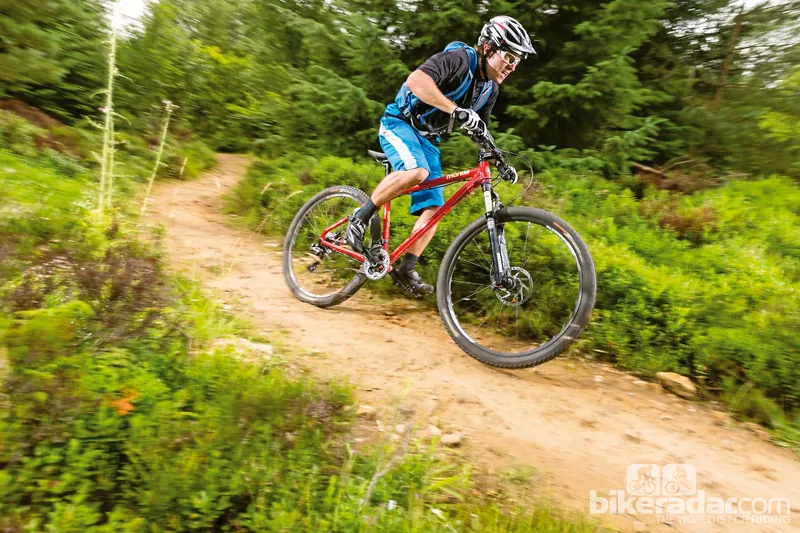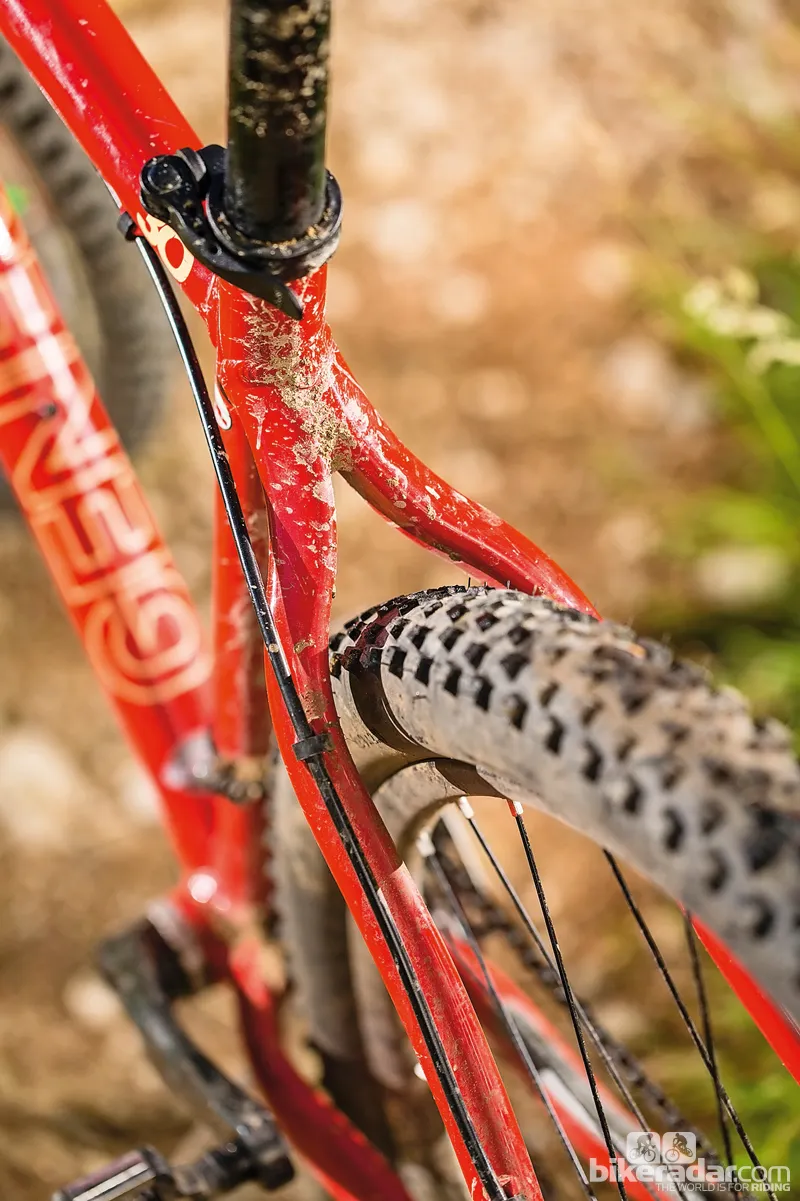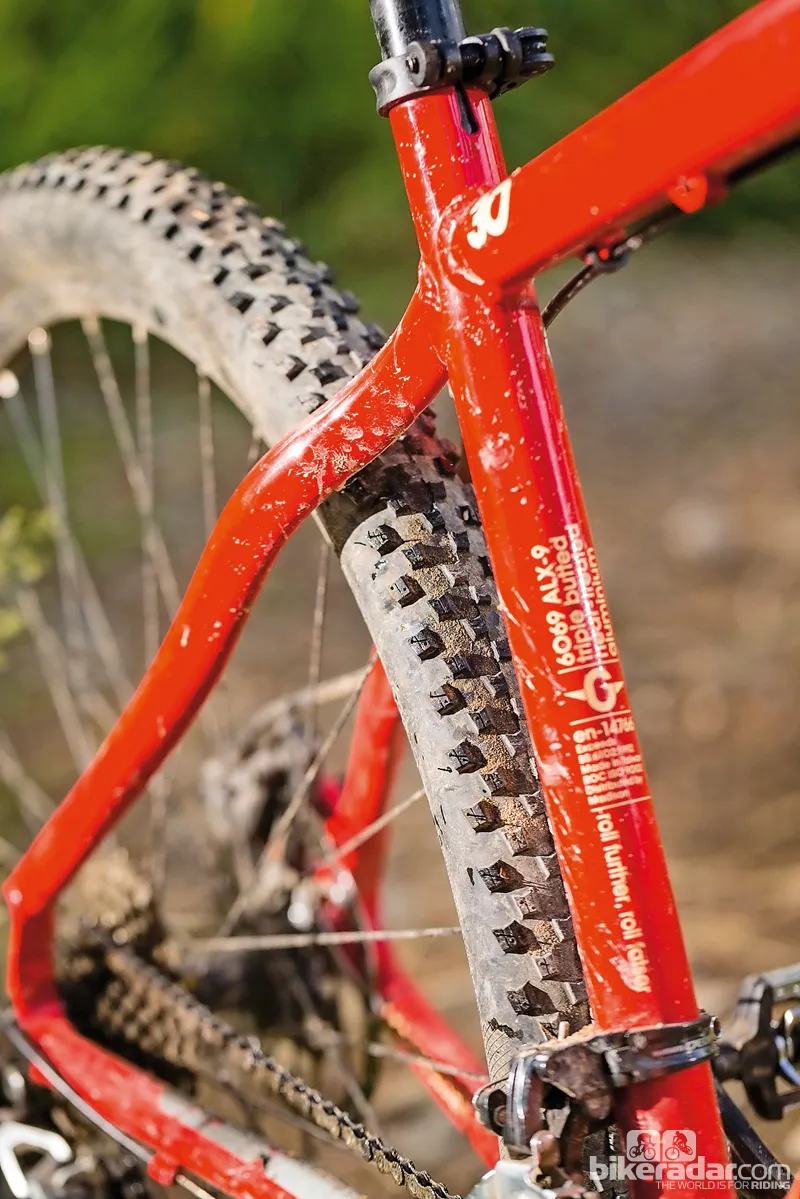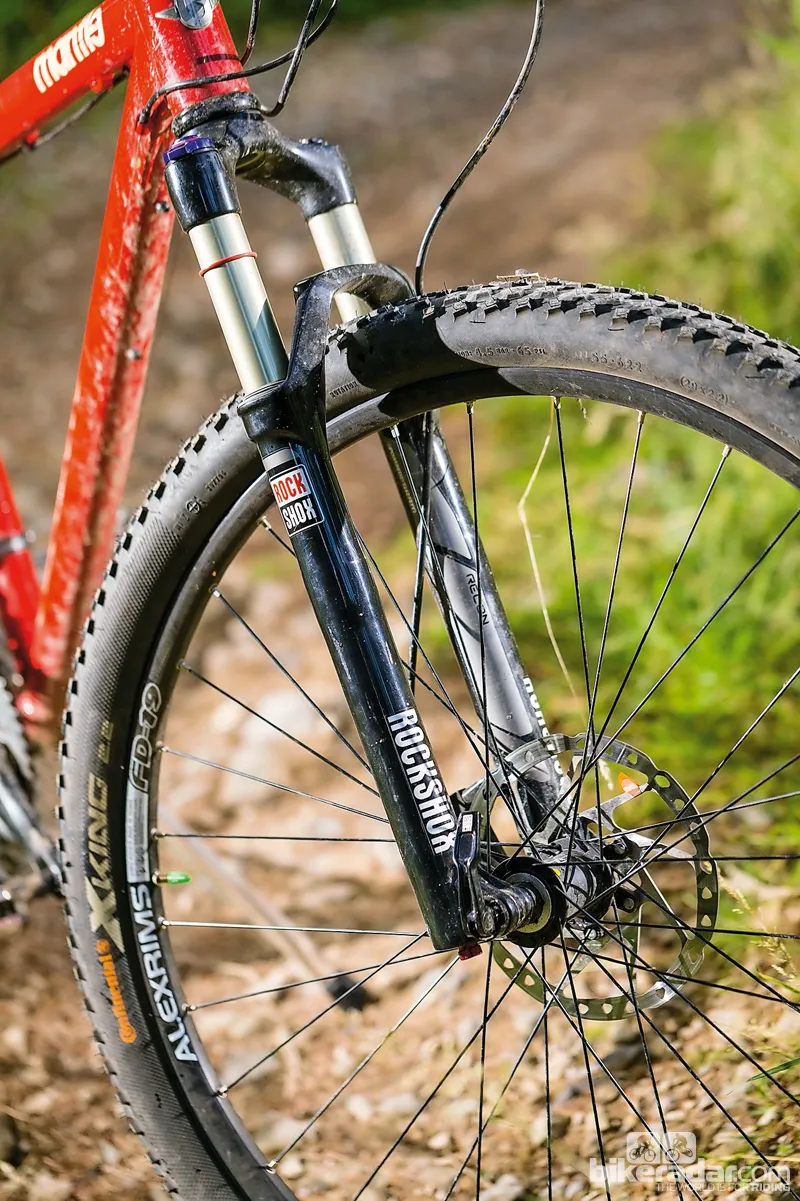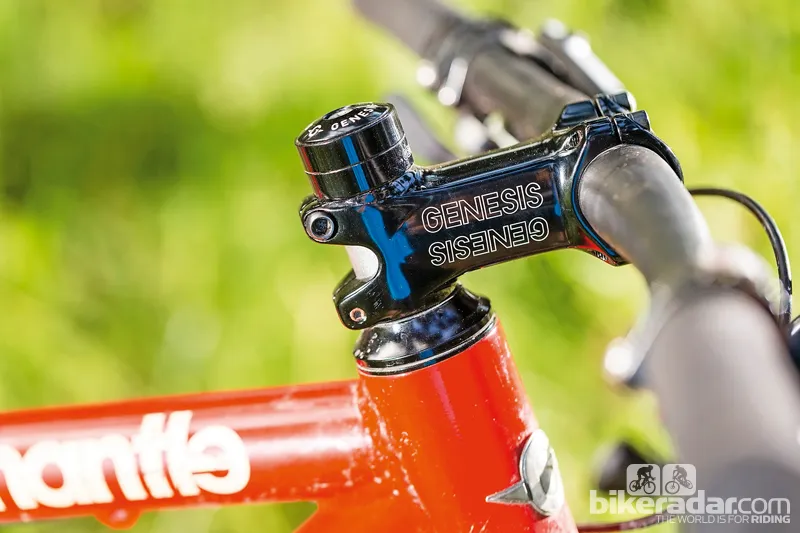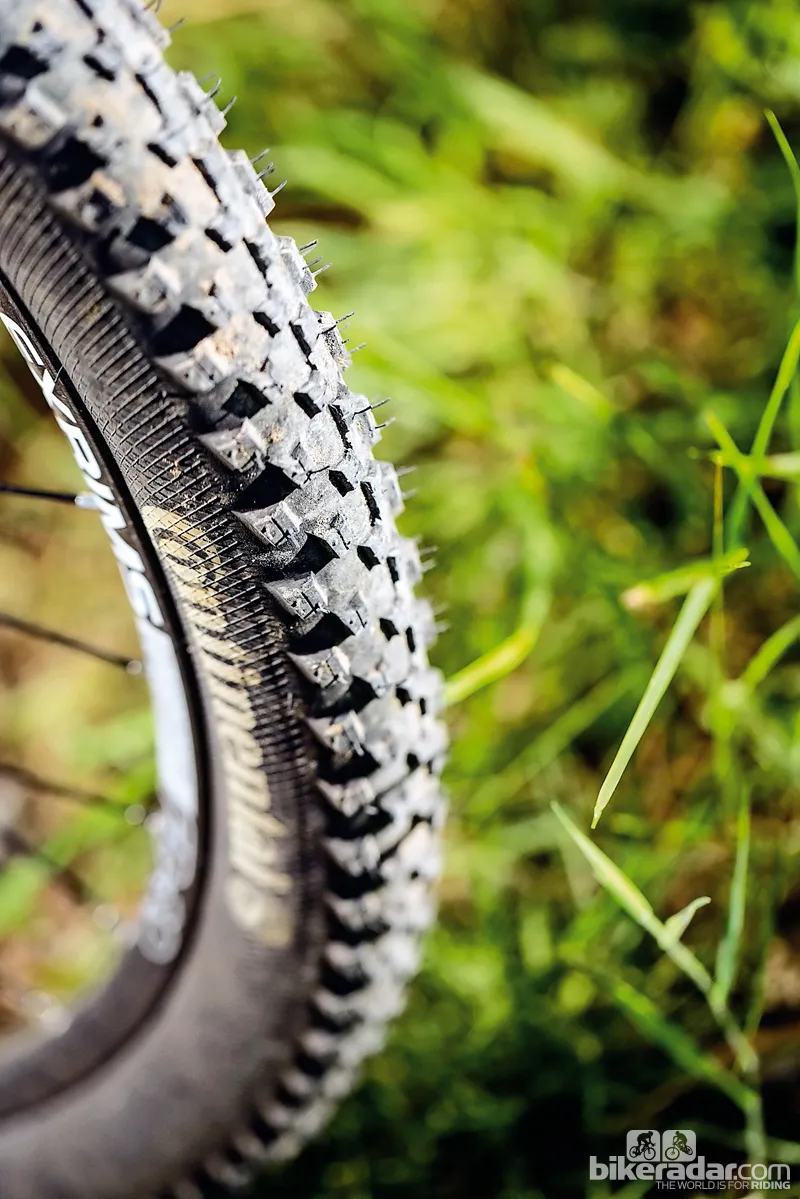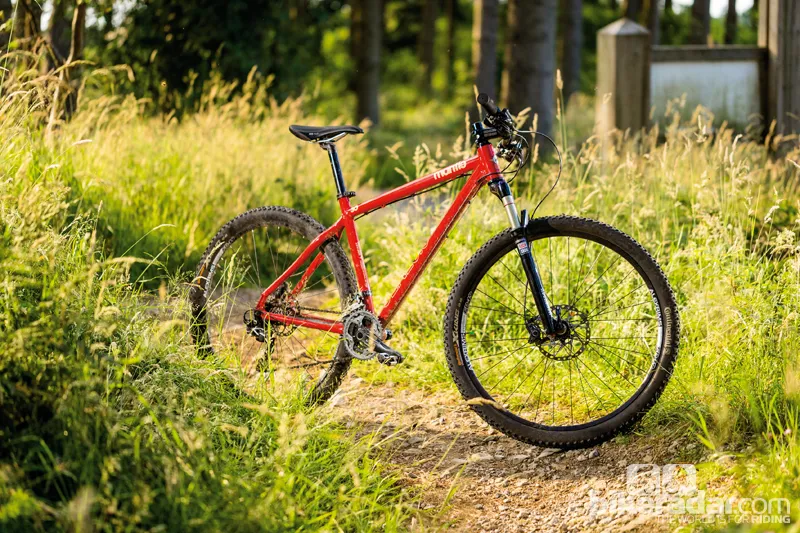Sitting at the top of Genesis' range of aluminium-framed big wheelers, the Mantle 30 is a more conventional foil to the likes of its steel-tubed, fully rigid Fortitude or the High Latitude adventure bike.
Its designer, Dom Thomas, is a firm believer in not messing about any more than is necessary - hence the classic round profile tubing on the triple-butted aluminium frame. There are plenty of nods to modernity however, with guides for a dropper post to fit in the 30.9mm seat tube, and decent mud clearance from the unbraced, swooping and chunky seatstays.
Frame and equipment: built to last
The Mantle 30 is equipped with a no-nonsense serving of Shimano's Deore 10-speed groupset, with a clutch-equipped SLX rear mech. It's not flashy, but it is solid, dependable and long-lasting. The triple – rather than double – chainset hints at the bike's remit, which is to cover everything from epic cross-country loops to woodsy, swooping singletrack.
Up front, there's a RockShox Recon TK fork in the 44mm internal diameter head tube, complete with tapered steerer, 15mm through-axle and a lockout. The 44mm headtube is particularly versatile and helps keep the front end low with its semi-integrated top bearing and external lower. While the fork's chassis
is precise enough – and looks similar to the more expensive Reba with its Powerbulge bushing reinforcement – the Recon's Turn Key damping lacks the subtlety of the Reba's Motion Control guts, and quickly loses composure on extended rough ground – where it shares its suffering with the rider's hands. Keep it to smoother, more swooping trails and it's more rewarding, with little bob even with the lockout left off.
The brakes are a high point, with 180mm front and 160mm rear Centerlock rotors clamped by the superb Shimano Deore callipers. Feel is excellent, and the performance differences between these and Shimano's higher-spec brakes are minimal. They're mostly just heavier.
The eyeletted, 19mm Alex rims strung to Shimano's heavy hubs don't make for the sprightliest 29er wheels we've felt at this price, but they're solid and, if kept well-adjusted, reliable. Again, they're a symbol of the conservative and considered nature of the spec, with durability trumping low weight and possible fragility wherever you look.
Ride and handling: harsh judgement
Unfortunately, this approach adds up to an all-in weight of 28lb, so the Mantle's acceleration from a standstill and out of corners hardly scorches. Trying to get up and hustle it through twisty trail sections gets tiresome rather quickly. That's compounded by the fact that a succession of test riders, from fresh 29er converts to dyed-in-the-wool short travel and big wheel enthusiasts, came back underwhelmed by its handling.
The 435mm chainstays are short for a 29er – that's achieved by curving the seat tube back slightly to an actual 72 degrees, so there's a definite rearwards weight bias when sitting down and pedalling. Combined with the longish 80mm stem and slack 67-degree head, the front end is vague on the flat and has a tendency to flop about when climbing. A switch to a shorter stem makes the front less floppy, but the side effect is hyperactive steering – we struggled to keep it pointed in line with the 680mm flat bars.
Push on downhill and the Continental Mountain King tyres don't help your confidence. Although fast-rolling, they're a hard compound that's frankly terrifying in the wet and merely adequate in the dry. The chunky, tough rear end also means that while power is very direct, it's not very compliant in the rough. This combines with the sketchy rubber to make finding traction a struggle. Also, as it lacks the skinny 27.2mm post found on Genesis' steel bikes, comfort really suffers too, especially on unrelenting, lumpy trail centre surfacing.
It's not all bad. On a constant gradient, if you're happy to maintain cruising speed and spin the pedals it'll swoop through the turns merrily. Try getting more dynamic and you'll be left wanting. Compared to the long toptube and very low bottom bracket of the new-school geometry, the Genesis feels high and, especially when out of the saddle, rather short, which really works against any enthusiastic descending.
The Mantle isn't a bad bike, but we just can't help feeling that recent developments in 29er geometry have left it by the wayside. And ironically, its durable and long-lasting spec only makes it harder and more expensive to meaningfully lighten it to a more cross-country-friendly weight – the extra mass is spread pretty evenly, rather than sitting in one or two easily-replaced elements. And while lighter wheels would help acceleration, they may reduce stability and fast-trail confidence even further.
If you're less of a trail smasher and prefer to spin and explore at your own pace, the Mantle may work for you, but the easily confused fork, harsh rear end, weighty build and awful tyres could still be an issue. There's no avoiding the fact that Whyte's 729, for instance, is amazingly capable both uphill and down, notably higher-spec and several pounds lighter for £250 more. If you want to sample Genesis' often-excellent take on hardtails, we'd push you towards its more characterful and capable steel frames.
